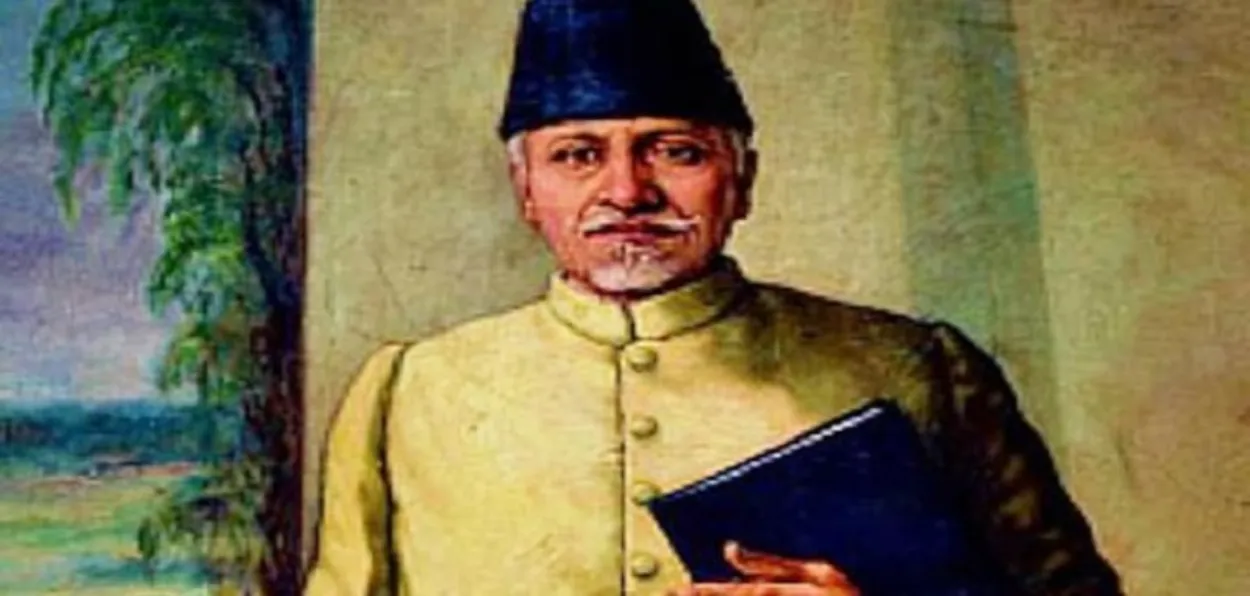
Zafar Darik Qasmi
In 1923, while presiding over a Congress session, Maulana Abul Kalam Azad said, “If an angel were to tell me that India’s freedom and Hindu-Muslim unity cannot both be achieved, I would sacrifice freedom for unity, for freedom is temporary, but unity is eternal.” (Āsār-e-Azad, p. 11)
For him, patriotism was not separate from religion—it was its continuation. The Qur’an, he believed, offers guidance for all humanity, teaching that love for one’s country is, in essence, love for mankind. He often said that Islam unites people through justice, morality, and piety—not through race or territory. (Khutbat-e-Azad, p. 210)
In his writings and speeches, he reminded people that dividing the nation in the name of religion harms both faith and humanity. His editorials carried a passionate call for unity and service to the motherland: “India is a garden where flowers of different religions spread their fragrance. If one flower withers, the beauty of the whole garden fades.” (Al-Hilal, 1913)
“Our religion does not stop us from serving our country; it commands us to give our lives for its protection and progress.” (Al-Balagh, 1915)
“I dream of an India where Hindus, Muslims, Sikhs, and Christians share each other’s joys and sorrows.” (National Conference, 1942)
“I am a Muslim and I am proud of it, but I am even prouder that I am an Indian.” (Congress Session, Ramgarh, 1940)
These lines capture the essence of his national vision—unity, tolerance, and selfless service.
Maulana Azad’s idea of a homeland was not limited to a piece of land but extended to a spiritual and moral fellowship among its people. His wisdom, sacrifice, and spirit of unity continue to inspire all Indians. He was a distinguished Islamic scholar, visionary thinker, and a true patriot who worked tirelessly for national harmony.
His vision was shaped by Islamic teachings and Qur’anic reflection. He viewed religion as a force for human welfare and social justice, and from this understanding grew his idea of patriotism rooted in moral and spiritual values. As an active member, and later the President, of the Indian National Congress, he regarded the freedom of India as not merely a political goal but a moral responsibility.
He believed that a nation under slavery could not progress, and therefore, true freedom must include both political and intellectual liberation.
Maulana Azad’s greatest contribution was his idea of composite nationalism, as an antidote to the British policy of “divide and rule.” He firmly believed that all Indians—regardless of religion—belonged to one nation. In his view, nationality was defined not by religion but by a shared homeland and collective destiny. He famously said, “The basis of our nationality is not religion but our land. We are all children of the same soil.”
He strongly opposed the Two-Nation Theory in 1940, calling it contrary to both the interests of India and the true spirit of Islam. Through his journals Al-Hilal and Al-Balagh, Azad awakened a sense of national consciousness among the youth. Despite the British sending him to jail several times, he never compromised his principles.
As India’s first Minister of Education, Maulana Azad believed that education was the true foundation of a strong nation. Without knowledge, he said, patriotism becomes an empty slogan. For him, only an enlightened society could build a free and progressive homeland. His patriotism was spiritual as well as political.
He saw the homeland as a sacred bond of individuals to their past, culture, and collective identity. Love for one’s country, he wrote, is a natural and moral impulse that ties a person to their soil, language, and people. Even during the painful days of Partition in 1947, Azad remained steadfast in his faith in unity. He warned that dividing India would neither serve Islam nor strengthen the nation: “If India is divided today, it will be divided again tomorrow. Repeated division will destroy the soul of this land.” (Āsār-e-Azad, p. 13)
His works, particularly Ghubar-e-Khatir and Tazkirah, reveal his deep love for the homeland and his faith in moral and intellectual freedom. Even in prison, his writings reflected hope, justice, and human dignity.
ALSO READ: Azra Naqvi uses mobile app to further the cause of Urdu and women writers
In essence, Maulana Abul Kalam Azad’s concept of patriotism was not merely political—it was a complete moral, religious, and human philosophy. He proved that love for one’s country strengthens rather than contradicts one’s faith. His message remains timeless: unity, tolerance, education, and justice are the pillars of a nation’s strength. Maulana Azad’s vision continues to serve as a guiding light for India, reminding us that a homeland is not defined by borders but by the unity of hearts.
Dr. Zafar Darik Qasmi is an Islamic scholar and author based in Aligarh
